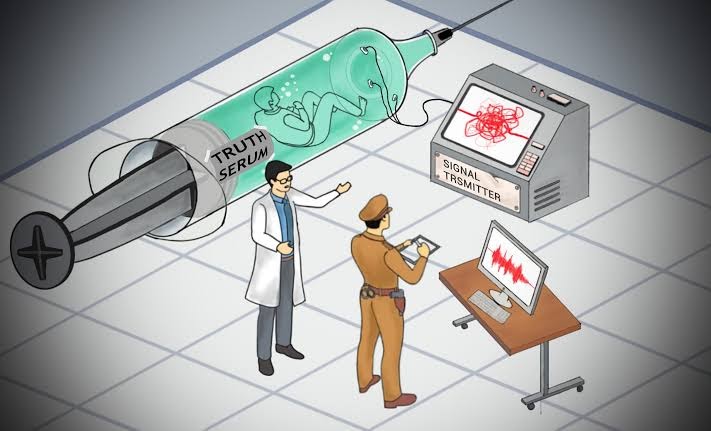-
ceo.bfi@gmail.com
Send Email
-
2C, C-6/A Block, Janakpuri, Delhi India 110058
Visit Our Office
99902-92279
Confidentiality Guaranteed
99902-92279
Confidentiality Guaranteed

Jun
NARCO ANALYSIS

Narco analysis, commonly known as the narco test, is an investigative technique in which certain drugs—typically truth serums like Sodium Pentothal—are administered to a subject to induce a semi-conscious, hypnotic-like state. In this altered state, imagination is neutralised, and the subject becomes more talkative and less inhibited, allowing investigators to extract information or material connected to a crime.
Although portrayed dramatically in the media, narco analysis is primarily a psychological and pharmacological technique used as an investigative aid rather than conclusive evidence. Its use has been controversial due to legal implications, ethical concerns, and constitutional safeguards under the Indian Constitution.
What Is a Narco Analysis Test?
A narco analysis test involves giving controlled doses of drugs that transports them to a hypnotic or semi-conscious state. In this condition, the person may speak freely, recall suppressed memories, or answer questions without deliberate filtering.
Key features:
Reduces conscious control
Lowers inhibitions
Makes the subject more talkative
Helps investigators discover leads
However, the test does not guarantee truthful answers, as the person may mix imagination with reality.
Narco analysis must be conducted in a hospital under medical supervision, using strict protocols.
The procedure includes:
Consent of the accused (mandatory)
Detailed medical and psychological evaluation
Preparation of intravenous drugs
Monitoring of heart rate, BP, and oxygen levels
Questioning conducted by investigators
Video and audio recording of the session
The guidelines for the administration of narco analysis, brain mapping, and the administration of polygraph tests were clearly laid down by India’s apex court.
The narco analysis procedure involves the use of sodium pentothal, commonly referred to as “truth serum.” This drug is administered through an intravenous injection by a qualified anesthetist. Here’s how the process typically unfolds:
Induction of Semi-Conscious State: Sodium pentothal, diluted with distilled water, is injected to induce a hypnotic or semi-conscious state. This lowers the person’s inhibitions and potentially makes them more susceptible to questioning.
Questioning Phase: In this altered mental state, the subject is asked a series of questions. The semi-conscious state may help retrieve suppressed memories or make the individual more likely to reveal information they might otherwise withhold.
Limitations and Reliability: The validity of information obtained through narco analysis is debated, as subjects may blend memories with imagination in this state. This makes it an investigative aid rather than primary evidence in most legal contexts
Legal Position Under the Indian Constitution
Narco analysis intersects with several constitutional protections:
1. Article 20(3) – Right Against Self-Incrimination
“No person accused of any offence shall be compelled to be a witness against himself.”
The Supreme Court held that narco analysis, when conducted without consent, violates this right.
2. Article 21 – Right to Life and Personal Liberty
Rights include dignity, bodily privacy, and medical safety. The test cannot violate these protections.
3. Consent of the Accused is Mandatory
A narco test cannot be forcibly conducted. The subject must give voluntary, informed consent, and must have access to a lawyer.
4. Not Legally Admissible as Sole Evidence
Statements made under these tests are not confessions.
But results can be admitted if:
They lead to subsequently discovered evidence
They reveal locations, weapons, or objects
They help in reconstructing events
Thus, narco analysis is primarily a tool to guide investigations, not replace them.
Supreme Court (Apex Court) Guidelines – 2010 Must Be Strictly Applied
The landmark judgment Selvi vs. State of Karnataka (2010) laid the foundation for the legal use of narco tests.
According to the apex court:
Narco, polygraph, and brain mapping cannot be conducted without consent
The subject must have access to a lawyer before consenting
The test must be conducted in a hospital
The process should be video-recorded
Investigators cannot use physical force
2000 must be strictly complied with (referring to the NHRC guidelines issued in the year 2000)
These guidelines ensure ethical, safe, and legally compliant usage.
Real Cases Where Narco Analysis Was Used
Below are some prominent Indian cases where narco analysis played a significant role:
1. The Nithari Serial Killings (2006)

Narco tests were administered on the accused Moninder Singh Pandher and Surinder Koli. The test provided information or material that helped investigators uncover details about the missing children and the horrific crimes committed in Nithari, Noida.
2. Aarushi–Hemraj Double Murder Case (2008)

Narco analysis was used on several individuals, including the domestic helpers. Although not conclusive, it provided investigative leads and helped refine the reconstruction of the murder timeline.
3. Telgi Fake Stamp Paper Scam (2000s)

Abdul Karim Telgi underwent narco testing. His statements gave investigators insight into the scale of the scam and the involvement of political and police personnel.
4. Bangalore Terror Case (2008)

Narco analysis helped identify additional suspects and planning details of terror modules. The information extracted was used to cross-verify surveillance data.
5. Sheena Bora Murder Case

Narco analysis was requested (though not always conducted for all suspects). The test became part of the debate over voluntary consent and investigative necessity.
Conclusion
Narco analysis is a powerful but controversial method used in Indian criminal investigations. It helps investigators uncover hidden details, reveal clues, and discover subsequently discovered evidence. However, its use is governed by strict safeguards under the Indian Constitution, requiring voluntary consent of the accused, oversight by medical professionals, and adherence to guidelines for the administration issued by the apex court.
While the narco test may assist investigation, it cannot replace scientific evidence or violate the constitutional right that no person shall be compelled to be a witness against themselves. Used carefully, ethically, and legally, narco analysis remains an important—yet limited—tool in the criminal justice system.

Interested in learning more about narco-analysis? Join us today. If you require the services of a forensic narco-analysis, don’t hesitate to contact us for a consultation.
📞 Contact Us: 9990292279
🌐 Visit Our Website: https://forensicexpertinvestigation.com/
✉️ Email: ceo.bfi@gmail.com




